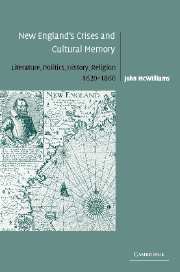Book contents
- Frontmatter
- Contents
- Acknowledgments
- Introduction: Crisis rhetoric: exclusion in New England history
- PART ONE PLANTATION AND SETTLEMENT
- 1 Of corn, no corn, and Christian courage
- 2 Thomas Morton: phoenix of New England memory
- 3 Trying Anne
- PART TWO TIME OF TROUBLES
- PART THREE REVOLUTION
- Epilogue: “bodiless echoes”
- Notes
- Index
3 - Trying Anne
Published online by Cambridge University Press: 22 September 2009
- Frontmatter
- Contents
- Acknowledgments
- Introduction: Crisis rhetoric: exclusion in New England history
- PART ONE PLANTATION AND SETTLEMENT
- 1 Of corn, no corn, and Christian courage
- 2 Thomas Morton: phoenix of New England memory
- 3 Trying Anne
- PART TWO TIME OF TROUBLES
- PART THREE REVOLUTION
- Epilogue: “bodiless echoes”
- Notes
- Index
Summary
The first word of this chapter title is intended to be both an adjective and a verb. Without the protection of any codified judicial procedures, Anne Hutchinson was twice tried, first banished and later excommunicated, at the end of lengthy “examinations” conducted first by civil magistrates and then by the clergy, both functioning as de facto courts. No one has denied that the so-called “Antinomian Controversy” nearly wrecked the Boston church, if not New England's Commonwealth, at the very outset. The crisis divided the ministers, the churches, the deputies and the Freemen among themselves and against each other, and ended in the exile, forced and unforced, of a goodly number of Boston's most wealthy, zealous, and influential church members. Nor has anyone denied that, once John Winthrop regained the governorship, most ministers and deputies supported him in using every legal and newly legal measure at the Commonwealth's disposal – including private conferences, a fast day, a synod, a listing of no less than eighty-two heresies, paper reconciliations, an alien law, disarming, elections, disenfranchisement, banishment, and excommunication (in that order) – in order either to bring the Antinomians to bay or to root them out of the Bay forever.
Even Anne Hutchinson's most committed defender should acknowledge, however, that she had proven to be constantly and implacably trying. “Trying” because she possessed, as John Cotton said when admonishing her, “a sharpe apprehension, a ready utterance, and abilitie to exprese yourselfe in the Cause of God”.
- Type
- Chapter
- Information
- New England's Crises and Cultural MemoryLiterature, Politics, History, Religion, 1620–1860, pp. 74 - 100Publisher: Cambridge University PressPrint publication year: 2004

